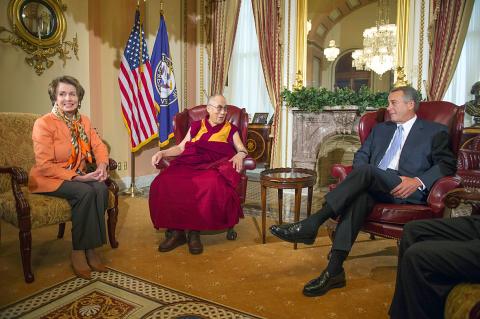The Dalai Lama on Thursday encouraged the US to show self-confidence in defending democracy as top lawmakers rallied behind his calls to preserve Tibetan culture.
Tibet’s exiled spiritual leader, whose meeting on Feb. 21 with US President Barack Obama was angrily condemned by China, returned to Washington where — for the first time — he delivered the customary prayer that opens each US Senate session.
The Dalai Lama later met congressional leaders and told them one of his main goals was “preservation of Tibetan culture.”

Photo: EPA
Offering advice as a “longtime friend” of the US, the Dalai Lama said that he considered the nation to be “really a champion of democracy, freedom.”
“These traditional values are, I think, very, very relevant in today’s world. After all, you are the leading nation in the free world, So, [show] self-confidence,” he said.
The Dalai Lama sat between US House of Representatives Speaker John Boehner, who said he wanted to show bipartisan support for the Buddhist monk, and the Republican leader’s often bitter rival Nancy Pelosi, a longtime activist on the Tibetan cause. He later met top senators.
“What is happening in Tibet is a challenge to the conscience of the world,” said Pelosi, the leader of Obama’s Democratic Party in the House of Representatives.
In contrast to his meeting with Obama, which the White House took pains to portray as private, the Dalai Lama was accompanied in his talks at Congress by Lobsang Sangay, who was elected in 2011 as the prime minister of Tibetans in exile.
The Dalai Lama told the lawmakers that he had transferred his political role to the elected leader. While the globe-trotting monk has been instrumental in throwing a worldwide spotlight on Tibet, the Nobel Peace Prize winner has increasingly been looking ahead to the future of the movement without him.
The Dalai Lama appeared to reflect on his own mortality as he served as the guest Senate chaplain. Offering prayers to the Buddha “and all other gods,” the Dalai Lama recited what he described as “my favorite prayer,” which he recites daily for inner strength.
Meanwhile, the Beijing government yesterday expressed anger over the meeting, urging the US to “stop conniving” with the man it brands a separatist working under the “cloak of religion.”
Chinese Ministry of Foreign Affairs spokesman Qin Gang (秦剛) said Beijing expressed “strong opposition and firm opposition” to the meeting and had “launched solemn representations with the US.”
“He is a political exile who has long been engaged in anti-Chinese separatist activities under the cloak of religion,” the spokesman told reporters at a regular briefing.
“China urges the US Congress to abide by its commitment of recognizing Tibet as a part of China, not supporting Tibetan independence, stop interfering in China’s domestic affairs with Tibet-related affairs, stop conniving and supporting the anti-China separatist activities by Tibetan independence forces,” Qin said.

MAKING WAVES: China’s maritime militia could become a nontraditional threat in war, clogging up shipping lanes to prevent US or Japanese intervention, a report said About 1,900 Chinese ships flying flags of convenience and fishing vessels that participated in China’s military exercises around Taiwan last month and in January last year have been listed for monitoring, Coast Guard Administration (CGA) Deputy Director-General Hsieh Ching-chin (謝慶欽) said yesterday. Following amendments to the Commercial Port Act (商港法) and the Law of Ships (船舶法) last month, the CGA can designate possible berthing areas or deny ports of call for vessels suspected of loitering around areas where undersea cables can be accessed, Oceans Affairs Council Minister Kuan Bi-ling (管碧玲) said. The list of suspected ships, originally 300, had risen to about

DAREDEVIL: Honnold said it had always been a dream of his to climb Taipei 101, while a Netflix producer said the skyscraper was ‘a real icon of this country’ US climber Alex Honnold yesterday took on Taiwan’s tallest building, becoming the first person to scale Taipei 101 without a rope, harness or safety net. Hundreds of spectators gathered at the base of the 101-story skyscraper to watch Honnold, 40, embark on his daredevil feat, which was also broadcast live on Netflix. Dressed in a red T-shirt and yellow custom-made climbing shoes, Honnold swiftly moved up the southeast face of the glass and steel building. At one point, he stepped onto a platform midway up to wave down at fans and onlookers who were taking photos. People watching from inside

Japan’s strategic alliance with the US would collapse if Tokyo were to turn away from a conflict in Taiwan, Japanese Prime Minister Sanae Takaichi said yesterday, but distanced herself from previous comments that suggested a possible military response in such an event. Takaichi expressed her latest views on a nationally broadcast TV program late on Monday, where an opposition party leader criticized her for igniting tensions with China with the earlier remarks. Ties between Japan and China have sunk to the worst level in years after Takaichi said in November that a hypothetical Chinese attack on Taiwan could bring about a Japanese

The WHO ignored early COVID-19 warnings from Taiwan, US Deputy Secretary of Health and Human Services Jim O’Neill said on Friday, as part of justification for Washington withdrawing from the global health body. US Secretary of State Marco Rubio on Thursday said that the US was pulling out of the UN agency, as it failed to fulfill its responsibilities during the COVID-19 pandemic. The WHO “ignored early COVID warnings from Taiwan in 2019 by pretending Taiwan did not exist, O’Neill wrote on X on Friday, Taiwan time. “It ignored rigorous science and promoted lockdowns.” The US will “continue international coordination on infectious